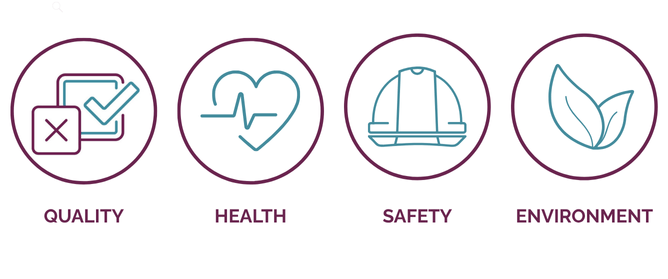When it comes to QHSE (Quality, Health, Safety, and Environment), most businesses mean well. They might even have a few policies tucked away in a binder or a dusty ISO certificate on the wall. But good intentions alone don’t protect people, impress clients, or satisfy regulators.
Whether you're running a warehouse, an office, or a construction site, these are the 5 most common QHSE mistakes UK companies make - and what to do instead.
1. Treating QHSE as a one-off project
Too often, companies approach QHSE like it’s something to be “done” once a year - usually when there’s an audit coming up or a client asks for paperwork.
Why it’s a problem:
A one-time effort won’t identify emerging risks, embed improvements, or keep you legally compliant.
How to avoid it:
Make QHSE a living, breathing part of your operations. Assign clear responsibilities, schedule regular reviews, and treat it as an ongoing cycle - Plan, Do, Check, Act.
2. Focusing only on health & safety (and ignoring quality and environment)
Many UK companies still focus heavily on safety (understandably), but neglect the other areas - like product quality or environmental impact.
Why it’s a problem:
You might be keeping people safe, but failing audits, losing customers, or breaching environmental regulations.
How to avoid it:
A well-rounded QHSE system balances quality assurance, environmental performance, and safety culture. If you’re only focusing on one, you’re missing opportunities—and possibly exposing your business to risk.
3. Not involving staff in QHSE
Policies created behind closed doors or delivered as dry PowerPoint presentations rarely stick.
Why it’s a problem:
If your team doesn’t understand the “why” behind your policies - or worse, sees them as pointless box-ticking - they won’t engage. That leads to poor compliance and hidden issues.
How to avoid it:
Make QHSE part of daily conversations. Provide regular training, ask for feedback, and encourage staff to report hazards or improvement ideas. A safety culture starts with ownership, not paperwork.
4. Failing to keep documents up to date
Out-of-date risk assessments, expired training records, or missing maintenance logs can quickly get you into trouble.
Why it’s a problem:
In a real incident - or an HSE visit - you need up-to-date records to prove compliance. Outdated documents suggest negligence, even if your intentions were good.
How to avoid it:
Use a simple document control system (spreadsheets, shared drives, or QHSE software) to track expiry dates and review cycles. Better still, partner with a QHSE consultant like Paragon QHSE who can manage it for you.
5. Trying to copy and paste someone else’s system
We often see companies trying to apply someone else’s QHSE templates without adapting them to their own operations.
Why it’s a problem:
What works for a large manufacturer won’t suit a small service-based company. Generic documents miss crucial site-specific risks or operational quirks.
How to avoid it:
Start with your business’s unique risks, activities, and goals. A good QHSE consultancy will build a tailored system that works for you, not just tick the ISO boxes.
Final word: Get it right, and the benefits add up
Avoiding these mistakes doesn’t just save time and legal headaches. It helps you:
Win more contracts
Retain talented staff
Boost operational efficiency
Build trust with customers and regulators.
QHSE is an investment, not a cost - and done well, it’s a powerful asset.
Need help getting your QHSE system right?
We help UK businesses across sectors develop smart, practical QHSE systems that work in the real world - not just on paper. Whether you’re aiming for ISO certification or just want peace of mind, we’re here to help.
Paragon QHSE is not your average Quality, Health, Safety and Environmental consultancy. We cut through the jargon and deliver straightforward, practical support that fits your business - not the other way around.
Get in touch today and see how we can support your business with clarity, not complexity.

